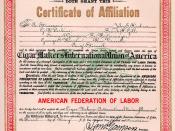The 19th Century Industrial Worker
The late 19th century was a time of great economic advancement in the United States. The United States was out-producing Europe, including Great Britain, France and Germany by overwhelming margins. This capitalist economic machine was powered by thousands of industrial workers. The atmosphere and working conditions that these industrial workers worked in were constantly changing. Technological changes resulted in different working conditions and sparked industrial workers to join labor unions.
In the late 19th century, a change slowly occurred in the way in which products were manufactured. No longer were workers themselves making a complete individual product, but rather constructing a small portion of a product. For example, a worker would not build an entire car; instead he would merely put a windshield in. This resulted in monotonous working conditions. In addition to these tedious working conditions, the new automated machines offered a high injury risk to workers whose hands or feet might slip into a gear of some sort.
Both of these conditions combined with long work hours resulted in a repetitive, life-threatening job. While most eventually ended up quitting their jobs, others searched for a more drastic solution.
These workers found their answer in labor unions. These groups of disgruntled workers could (in theory) have power over their employers by being able to organize strikes against their employers. However, in actuality, labor union strikes and protests were often unsuccessful and led to violence. Many times strike-breakers (scabs) were called in by employers to get around any negative economic effects that would normally be imposed upon strikers. So many new immigrants and those without jobs were moving to the city, however, so strikers were often quickly replaced by employers. While labor unions were generally regarded as unsuccessful they did revolutionized the industry. Small...



Good job !
I like it. Good job.
6 out of 7 people found this comment useful.